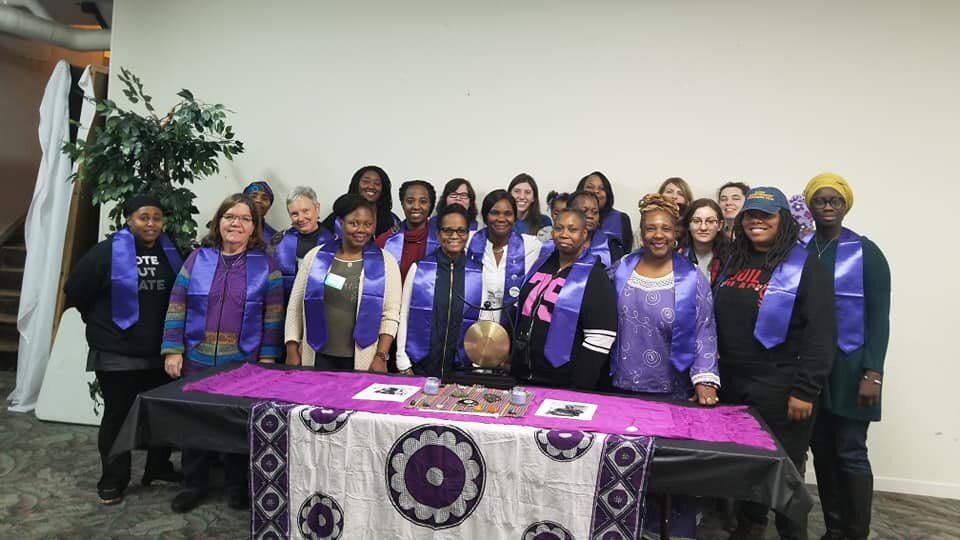POLITICAL HEALERS
IN ACTION
We bring cultural trauma into public memory and create space for healing. We are re-taking the stage and retelling the story. When political healers engage in collective action, we are community protectors. Community protector actions that specifically use ritual to highlight the cultural traumas of white supremacy and patriarchy impacting an oppressed person or group.
Community protector teams can operate within existing community organizing and campaign structures. The types of actions and activities organized by community protectors include:
Healing in Crisis Events (Community Healing)
Local events that are organized immediately following a community crisis that provides community members with a place to fellowship and heal with other community members, and, if the community so chooses, to plan a collective response to the crisis.
For more details, check out the Purpose/Outcomes/Process (POP) for one of these gatherings
Crisis Support Teams
Teams trained to track and support community members who are directly impacted by a crisis, as they navigate through institutional systems & processes -- engagement with police, EMT and other medical staff, lawyers, etc. Crisis support teams also provide comfort to directly-impacted community members, in all of their PIES, including offering rides or clothing, securing babysitting, making meals or buying groceries, housecleaning, counseling, physical healing support (i.e. massage). It is a way of showing solidarity with and taking care of friends and community so that they might more quickly find healing, resolution and peace.
Radical Hospitality Teams
Teams trained to provide healing and to infuse the principles of feeling safe, seen and heard into logistical support structures for any movement-based event or gathering. Generally speaking, this team is responsible for ensuring that the PIES needs of all event attendees are met, and done so with human honor. Radical Hospitality Teams recruit and train people to drive a) event registration, b) welcoming and providing direction to event attendees, c) onsite logistics support, d) liaise with venue staff, e) creating and staffing a healing space for event attendees, f) providing healing or bodywork at the event, g) holding space with individual attendees in moments where healing is needed, and h) creating healing justice programming within the event - just to name a few!
The specific function of a Radical Hospitality Team can be tailored to meet specific event needs, but should always have the outcome of ensuring that ALL people at the event feel safe, seen and heard. This is not a short order and does not happen overnight. Therefore, it’s highly recommended that Radical Hospitality Teams be created as affinity teams - teams dedicated to playing a specific role with a set of organizations or communities, thereby recruiting and developing expert leadership in the delivery of that team’s function. For example, a jail support affinity team that offers jail support to a set of organizations in a particular region when they conduct CD actions.
Protecting our Political Allies (Elections)
Co-Governance Councils (political engagement)
Local teams of political healers who support the orientation of newly-elected womxn of color officials into office, on all levels of PIES, and works regularly with elected officials to ensure alignment between their political action and the collective community will. This could include:
Articulating templated areas of transitions in each PIES area (i.e P = move into office; I = priority briefings, E=child care covered, S= sunday swimming scheduled )
Supporting the operationalization of political platforms by serving as an advisory team to elected officials.
Meeting regularly with elected officials to a) deepen relationships between them and community leadership; b) set aligned community political agendas; c) provide continued support for the elected officials public PIES.
Board Member Brandy Brooks and Rep. Ayanna Pressley at an event focused on the lead
Protecting our Rights & our Narratives (Direct Action)
Rapid Response Teams (local direct action)
Local teams, trained in healing justice, narrative, and radical, direct action, prepared to rapidly respond to local and national crises that directly impact womxn of color, trans and queer womxn and GNC, non-binary people.
Impact Teams (campaign engagement)
People embedded in campaign teams who ensure that the experience and leadership development of WOC and queer WOC are at the center of the campaign. I.e. The Warren bill is out; what’s the impact of that on WOC? Figuring out how the work we’re doing broadly specifically impacts womxn/queer/trans of color.
Affinity Teams (Single Purpose)
An affinity team is a small team of 5 to 20 people who work together autonomously to develop their collective skills toward providing a specific function within movement spaces. Affinity teams challenge top-down decision-making and organizing, and empower those involved to develop their leadership and to take creative action. These teams could specialize in any of the above community protector teams, providing leadership on the described areas. They could also be teams that provide support to key organizational operations in urgent or short-capacity moments. For example an affinity social media team could be propositioned to run social media for an organization’s mass meeting, or for an action among several organizations. Organizing for Power has written a fairly concise overview of the history of “Affinity Groups," upon which this affinity team model is based.




